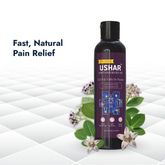Respiratory Health • 8–10 min read • Updated: 26 Oct 2025
Asthma affects more than 3.5 crore people in India and over 260 million worldwide. Despite modern inhalers and medication, many patients continue to struggle with symptoms that disrupt daily life. Integrative medicine — combining conventional care with lifestyle, diet, and Ayurvedic support — offers new possibilities for lasting relief.
Understanding Asthma: What’s Happening in the Body
Asthma is a chronic inflammatory disorder of the airways. During an episode, the airway lining swells, mucus production increases, and muscles tighten — narrowing the passage and making breathing difficult.
| Component | Role | Impact During Attack |
|---|---|---|
| Airway Lining | Protects & filters inhaled air | Inflamed and swollen |
| Bronchial Muscles | Regulate air flow | Contract, narrowing passages |
| Mucus Glands | Trap particles | Overproduce mucus, causing blockage |
Standard Treatments — and Their Limitations
- Inhalers (Bronchodilators & Corticosteroids): Provide rapid relief or control inflammation but can cause dryness, jitteriness, or over-dependence.
- Antihistamines & Steroids: Manage allergic asthma but may not address root triggers like gut inflammation or lifestyle stressors.
- Environmental Control: Avoiding dust, smoke, and allergens helps — but not everyone can fully control their environment.
Where Integrative Medicine Steps In
Integrative care blends evidence-based allopathic treatment with Ayurvedic principles, breathing exercises, and dietary support. The goal: reduce inflammation, improve lung capacity, and strengthen overall resilience.
1) Ayurvedic & Herbal Support
- Herbs like Vasaka (Adhatoda vasica), Tulsi, Yashtimadhu, and Pippali have documented anti-inflammatory and bronchodilatory properties.
- Ayurvedic management focuses on balancing Kapha and Vata doshas through detoxification and nourishment.
- Studies have shown that such integrative approaches can reduce inhaler dependence over time when medically supervised.
2) Breathing Techniques & Yoga
- Pranayama (especially Anulom Vilom and Bhramari) can help improve lung function and reduce anxiety.
- Daily slow, deep-breathing exercises improve oxygen exchange efficiency.
3) Diet & Lifestyle Adjustments
- Warm, cooked meals with turmeric, black pepper, and ginger to reduce inflammation.
- Avoid cold, processed, and mucus-forming foods like fried snacks and dairy in excess.
- Stay hydrated and maintain indoor air quality (humidifiers, clean filters).
4) Stress & Sleep Balance
Chronic stress elevates cortisol and worsens airway sensitivity. Regular meditation, restorative sleep, and gentle exercise create hormonal balance and improve asthma control.
VAJAB Healthcare’s Supportive Role
VAJAB Healthcare is developing natural respiratory wellness solutions inspired by Ayurveda and modern science — combining purity with clinical sensibility.
- Formulations designed to support airway comfort and mucosal balance
- Helps complement prescribed medical care safely
- Non-addictive and suitable for long-term use under supervision
Note: These formulations are supportive. Asthma management should always be doctor-supervised.
Real-World Example: Integrative Recovery
In one clinical case reported by Adyant Ayurveda (PMC), an asthma patient achieved significant improvement and reduced inhaler dependence through a combination of herbal support, Panchakarma detoxification, and breathing exercises — alongside continued modern care.
Practical Tips for Everyday Management
- Always warm up before workouts and avoid outdoor exercise in high pollution.
- Follow a fixed sleep routine and manage stress actively.
- Keep rescue inhalers handy; never replace prescribed medication without supervision.
- Review your plan with a pulmonologist every 6–12 months.






